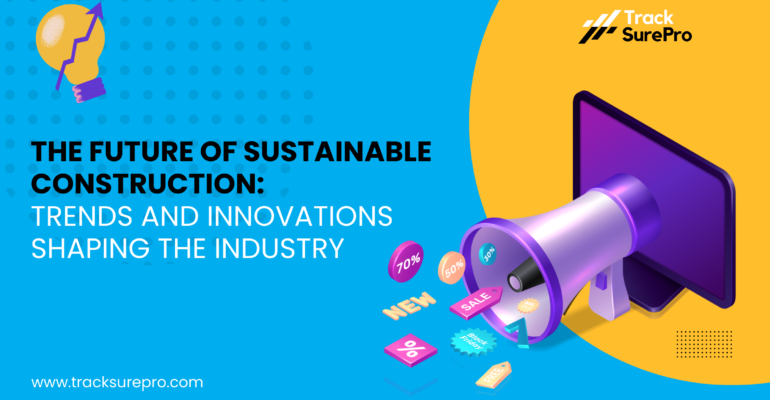The Future of Sustainable Construction: Trends and Innovations Shaping the Industry

The Future of Sustainable Construction: Trends and Innovations Shaping the Industry
Introduction:
Sustainability has become a cornerstone of the construction industry, driven by the need to minimize environmental impact, reduce resource consumption, and create healthier living spaces. In this blog post, we explore the latest trends and innovations shaping the future of sustainable construction, highlighting key strategies that contractors and developers can adopt to embrace a greener approach to building.
- Embracing Green Building Materials:
- The use of eco-friendly building materials such as recycled steel, bamboo, and reclaimed wood is gaining momentum in the construction industry. These materials offer several advantages, including reduced carbon footprint, improved indoor air quality, and enhanced energy efficiency. By incorporating green building materials into their projects, contractors can minimize environmental impact while creating healthier and more sustainable structures.
- Implementing Energy-Efficient Design:
- Energy-efficient design principles are becoming increasingly important in sustainable construction projects. Techniques such as passive solar design, natural ventilation, and high-performance insulation help reduce energy consumption and lower utility costs. Integrating renewable energy sources like solar panels and wind turbines further enhances the sustainability of buildings, allowing them to generate clean, renewable energy onsite.
- Adopting Prefabrication and Modular Construction:
- Prefabrication and modular construction methods offer significant advantages in terms of efficiency, cost-effectiveness, and sustainability. By manufacturing building components offsite in controlled factory environments, contractors can minimize waste, optimize material usage, and reduce construction timelines. Additionally, prefabricated and modular buildings often feature superior energy performance and can be easily disassembled and repurposed, promoting circular economy principles.
- Incorporating Smart Building Technologies:
- The rise of smart building technologies is revolutionizing the way construction projects are designed, constructed, and operated. IoT-enabled sensors, building automation systems, and predictive analytics tools provide real-time insights into energy usage, occupant behavior, and environmental conditions, allowing for more efficient resource management and proactive maintenance. By leveraging smart technologies, contractors can optimize building performance, enhance occupant comfort, and reduce operational costs over the long term.
- Prioritizing Water Conservation:
- Water scarcity is a growing concern worldwide, making water conservation a critical aspect of sustainable construction. Contractors can incorporate various strategies to minimize water usage on construction sites, such as installing low-flow fixtures, implementing rainwater harvesting systems, and utilizing drought-resistant landscaping. Additionally, designing buildings with water-efficient plumbing systems and graywater recycling technologies can further reduce water consumption and promote sustainability.
- Emphasizing Green Infrastructure and Landscaping:
- Green infrastructure elements such as green roofs, permeable pavement, and bios wales are increasingly being integrated into construction projects to manage storm water runoff, mitigate urban heat island effects, and enhance biodiversity. These features not only improve environmental performance but also create aesthetically pleasing and functional outdoor spaces for building occupants to enjoy. By prioritizing green infrastructure and landscaping, contractors can enhance the sustainability and resilience of their projects while providing additional benefits to the surrounding community.
- Investing in Sustainable Certifications and Standards:
- Achieving third-party certifications such as LEED (Leadership in Energy and Environmental Design) or BREEAM (Building Research Establishment Environmental Assessment Method) demonstrates a commitment to sustainable construction practices and can enhance the marketability of a building. Contractors can pursue certification for their projects by implementing sustainable design strategies, meeting performance criteria, and adhering to rigorous environmental standards. By obtaining sustainable certifications, contractors can differentiate their projects in the market and attract environmentally conscious clients and tenants.
Conclusion:
The future of construction is undeniably green, with sustainability driving innovation and shaping industry practices. By embracing trends such as green building materials, energy-efficient design, prefabrication, smart technologies, water conservation, green infrastructure, and sustainable certifications, contractors can position themselves at the forefront of the sustainable construction movement. With TrackSurePro’s comprehensive project management solutions, contractors can seamlessly integrate sustainability initiatives into their projects, track progress, and optimize performance, ultimately contributing to a more sustainable built environment for future generations.

